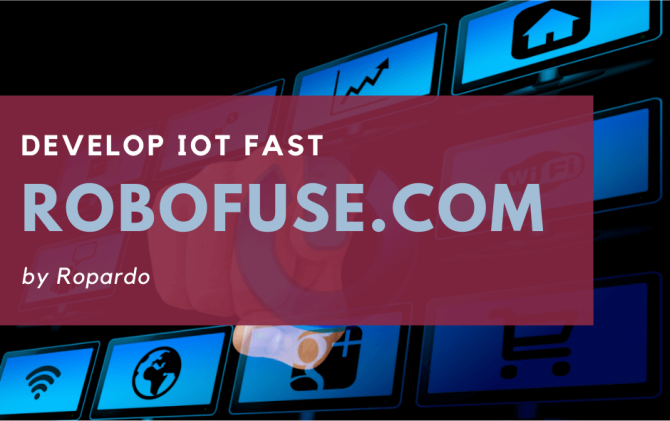By now one should know that a typical Internet-of-Things (IoT) solution is an ecosystem made of many devices, aka things, that use some form of gateway to communicate through a network to an enterprise back-end server. This back-end server is running an IoT platform that helps integrate the IoT information into the existing enterprise. The roles of the devices, gateways, and cloud platform are well defined, and each of them provides specific features and functionality required by any robust IoT solution.
These days, Internet of Things is one of the most critical verticals in custom software development. But, building an IoT solution is a complex process that tackles both hardware and software that must be thoroughly developed and tested before it can be used in an end-to-end solution. Developing an IoT application is an on-demand service with a challenging and time consuming process behind the scene. The project of creating an IoT application requires various resources: money, time and IoT specific skills.
To make this process effortless, Ropardo created RoboFuse. RoboFuse is an IoT Development platform that ingests data from different sources / devices, process data and store them. It also ensures integration with analyses tool and is capable to publish data using different channels and custom integrations. If you are thinking of building a custom IoT project you can start with RoboFuse to gain speed to market and invest less effort.
Moreover, there are open-source software tools that service providers can use to build apps for the Internet of Things.

Open source software tools that help you build IoT applications
DeviceHive
DeviceHive is an open-source platform which provides tools for your smart devices communication and management. It consists of the communication layer, control software and multi-platform libraries and clients to bootstrap development of smart energy, home automation, remote sensing, telemetry, remote control and monitoring software and much more.
Smart home technology, automation, security and remote sensors are some of the potential applications. The tool’s website is an active community, which includes blog posts from enthusiasts.
Home Assistant
Home Assistant is an open-source and free home automation software, written in Python, that gears the core control system in a smart house or home. It mainly focuses on privacy and local-control and benefits of extended device support.
Home Assistant can be controlled with desktop and mobile browsers, its main area of application being obviously home automation. As an open-source software, it’s relatively easy to set up and also appreciated for its privacy and security capabilities.
Arduino
An open-source electronics platform based on easy-to-use software and hardware, Arduino is one of the most known platforms. With the development kit, users get to code in the language of the tool, with an integrated development environment or IDE. Data can be sent to the cloud system using MQTT broker, which allows developers to send messages from board to board.
Projects created using the tool include a method for taking pictures, a location tracking device for pets, car parking system and many more.
DeviceHub.net
An integrated solution for any IoT development project that combines cloud integration and business intelligence to synthesize web and hardware technologies. It allows the rapid development of a fleet management system, portable technologies and intelligent automatic machines.
Custom application development programs could be rebranded, thoroughly white-labeled, and installed on-premise, or on a virtual private cloud for deploying enterprise-grade apps.
KAA
KAA is an excellent all-around tech piece for anyone considering IoT development. The middleware allows custom software developers to build IoT solutions, connected apps, as well as all types of smart products. The pluses of KAA are that it’s easy to set up, it offers a lot of features that can be plugged into the platform easily as well as end-to-end connected devices support across a big cloud.
The open-source kit is said to be ‘hardware agnostic’, meaning it can interface with just about any hardware, including sensors, gateways, and devices. It can also be used to set up cross-device interoperability, analyze user behavior, and distribute firmware updates over the air to deliver the notifications targeted.
Kinoma
Kinoma is a hardware prototyping development suite consisting, in fact, of three different projects: Kimona Studio is a development environment that unites the Kinoma Create tool and the Kinoma Platform Runtime to design Internet-connected smart device applications.
Create is a JavaScript-powered construction tool that encompasses everything you need to design and prototype small-scale IoT tools and applications for light connectors, temperature sensors, actuators and others.
Kimona Connect is a free application that runs on iOS and Android and provides easy-to-set-up data flows between smartphones and tablets with Internet of Things-enabled devices.
RIOT
RIOT is not only open-source and free but it’s also supported by a solid development community bringing together academia, hobbyists, and companies worldwide. It supports the most low-power Internet of Things devices, as well as microcontroller architectures. It aims to implement all-important open standards supporting IoT that’s secure, durable, connected, and privacy-friendly.
Functioning as a Linux alternative, RIOT is a microkernel OS that supports numerous chip architectures, which supports IPv6, RPL, UPD, and 6LoWPAN. With minimal processing, memory usage, and power, the tool is best for low-power microcontrollers and small sensors networks.
Conclusions
IoT is an important area to approach in your business, and needs specific adaptation and customization to maximize the value of your investment. The open source IoT tools presented above are possible basics for smart systems and ensures you freedom that is you will not be tied forever to a specific provider. Yet, you should keep in mind that some may work successfully in some scenarios, but others may not. With an experienced custom software development company by your side, you can choose those open-source IoT tools that really are a suitable digital transformation for your business.
